Right now, our team is deep in several custom eCommerce AI projects, and we’re seeing first-hand what actually works versus what’s just noise. Behind every “AI-powered” headline, there’s a simple truth: most businesses are still experimenting, hoping for results that rarely show up on the bottom line. But when artificial intelligence is implemented with precision, the shift is immediate – average order value (AOV) climbs by 10-15%, cart abandonment drops, and shoppers feel like every interaction was built for them.
AI in eCommerce is no longer a distant promise. It’s reshaping the way products are discovered, compared, and purchased. Personalized recommendations, predictive bundling, and smarter promotions aren’t “nice-to-haves” anymore – they’re quickly becoming the standard. And the market reflects it: global eCommerce AI spending is growing at double-digit rates, with retailers racing to close the gap before competitors lock in customer loyalty.

The debate over whether AI belongs in your eCommerce strategy is over. It’s how fast you can turn it from an undefined expense into a measurable growth lever. In this article, we’ll show you how artificial intelligence can stop being a vague investment and start multiplying your AOV – with clear AI use cases in eCommerce, proven approaches, and strategies you can act on today.
Table of Contents
AI in eCommerce Statistics
In 2026, the global digital eCommerce sector is valued at $8.65 billion, and by 2032 it’s expected to more than double to $22.6 billion, growing at a CAGR of nearly 15%. Some analysts go even further, forecasting that AI in eCommerce could surpass $50 billion by 2033 at an annual growth rate above 24%. Whichever projection you trust, one thing is clear: intelligentization is inevitable.
And businesses aren’t waiting. Today, about 51% of companies are already using this technology in some capacity. Another 48% are actively testing pilots, leaving only a tiny fraction of retailers untouched by the trend. In other words, if you’re still debating whether AI belongs in your roadmap, your competitors are already gathering the data, building the models, and pulling ahead.
The impact on performance is just as striking. AI personalization in eCommerce can contribute up to 31% of total revenue. Conversion rates often rise by 15–23 % when customization is deployed at scale, and digital chatbots have been shown to boost sales by as much as 67% during assisted shopping experiences. Beyond immediate sales, AI has become a loyalty engine: predictive analytics and tailored promotions are driving measurable increases in customer retention, often cutting churn by double digits. In fact, one AI-driven loyalty program study found churn reductions of up to 25% when personalization and predictive engagement were used.
Looking ahead, adoption will only accelerate. For retailers, the choice isn’t whether to use artificial intelligence, but how fast they can transform it from a vague investment into a multiplier of AOV, retention, and long-term growth.
Benefits of AI in eCommerce
Most articles stop at broad promises: personalization, automation, better insights. But as a business owner or eCommerce leader, you don’t care about buzzwords – you care about higher margins, reduced waste, and customers who come back for more. Here are AI in eCommerce examples that translate into real outcomes for your store.
Show the Right Product to the Right Person at the Right Time
Customer-centricity isn’t about revenue, not flashy tech. When an algorithm analyzes browsing behavior, purchase history, and even micro-signals like dwell time, it can surface the product each client is most likely to buy. The result? More items in carts, bigger basket sizes, and fewer wasted impressions. Instead of sending the same promo to 100,000 shoppers, you can nudge 10,000 with the exact product they’re ready to purchase – one of the best examples of AI in eCommerce driving tangible profit.
Do More With Less: Automate Operations and Cut Costs
Manual merchandising, inventory checks, and campaign management eat up time and payroll. AI-enabled eCommerce tools automate these repetitive tasks – from real-time inventory adjustments to dynamic pricing. That means fewer stockouts, fewer discounting mistakes, and fewer hours lost to spreadsheets. In fact, retailers using automation often see operational cost reductions of 15–30% while improving processing speeds by up to 40%. Your team shifts from firefighting to strategy, while your bottom line reflects real savings.
Stop Fraud Before It Costs You
Chargebacks and fraudulent orders quietly erode profit. AI systems trained on billions of transactions can flag suspicious activity instantly, spotting patterns no human analyst could catch. The payoff is direct: fewer chargebacks, lower fraud losses, and stronger trust from your customers. Actually, companies using AI-based fraud detection have reported reductions in fraud losses of up to 50% within a year. Security becomes invisible, but the savings are measurable.
Make Smarter Calls with Predictive Analytics
Guessing at what users might buy or how demand will shift leads to overstock, wasted marketing spend, or missed revenue. AI technologies for eCommerce replace guesswork with predictive insights, showing which products will trend, when demand will peak, and how customers are likely to behave. In one retail study, ML-driven demand forecasting reduced inventory costs by 22% and cut stockout rates by 18%. So instead of reacting, you can proactively align promotions, plan inventory, and invest budget where it delivers the highest ROI.
Stand Out, Sell More
In crowded markets, differentiation isn’t about who shouts louder, but about who delivers better experiences. AI helps you do both: hyper-personalized interactions on the front end, leaner operations on the back end. The businesses that adopt early build reputations for relevance and convenience. That translates to higher retention, faster growth, and revenue gains competitors can’t easily copy. Forward-thinking brands are already blending personalization with conversational shopping, creating seamless journeys that combine engagement, dialogue, and conversion in one flow. Already, retailers report that brands using chat to augment the buying process see conversion lifts of up to 35% – a clear example of how conversational commerce amplifies value.
The takeaway: AI in eCommerce isn’t about technology for its own sake. It’s about creating direct, measurable outcomes: more sales per person, leaner operations, reduced fraud, smarter strategy, and a stronger position in the market. The companies already putting AI to work are multiplying their AOV, defending their margins, and setting new benchmarks for client loyalty.
Real-World Case Studies: AI Applications in eCommerce
The best way to understand the power of technology is to see it in action. These AI in eCommerce examples showcase how Master of Code Global is using intelligent automation, personalization, and conversational experiences to drive measurable growth. From luxury retail to subscription services, each project reveals how AI transforms everyday operations into scalable, high-impact results.
Customer Experience & Assistance
- Zipify Agent Assist: AI for Customer Support Efficiency. Master of Code Global developed a bespoke solution to help Zipify optimize support workflows without sacrificing quality. The project combined an intelligent virtual assistant that empowered agents with instant knowledge and a robust analytical dashboard for real-time insights. The results were transformative: greater operational efficiency, reduced agent workload, continuous knowledge base growth, improved client satisfaction, and proactive identification of customer needs – all while boosting agent engagement and performance.

- La Mer Chatbot: Luxury Skincare Concierge. Another one of our AI in eCommerce examples is a digital skincare advisor for La Mer, designed to deliver beauty guidance and elevate user service. Built with over 3,350 trained utterances, the bot offers a “Find My Regimen” quiz to tailor routines, supports conversational product exploration, and integrates seamlessly with live chat for complex needs. This virtual tool combines intelligent automation with human expertise, providing buyers with a convenient and engaging shopping experience.
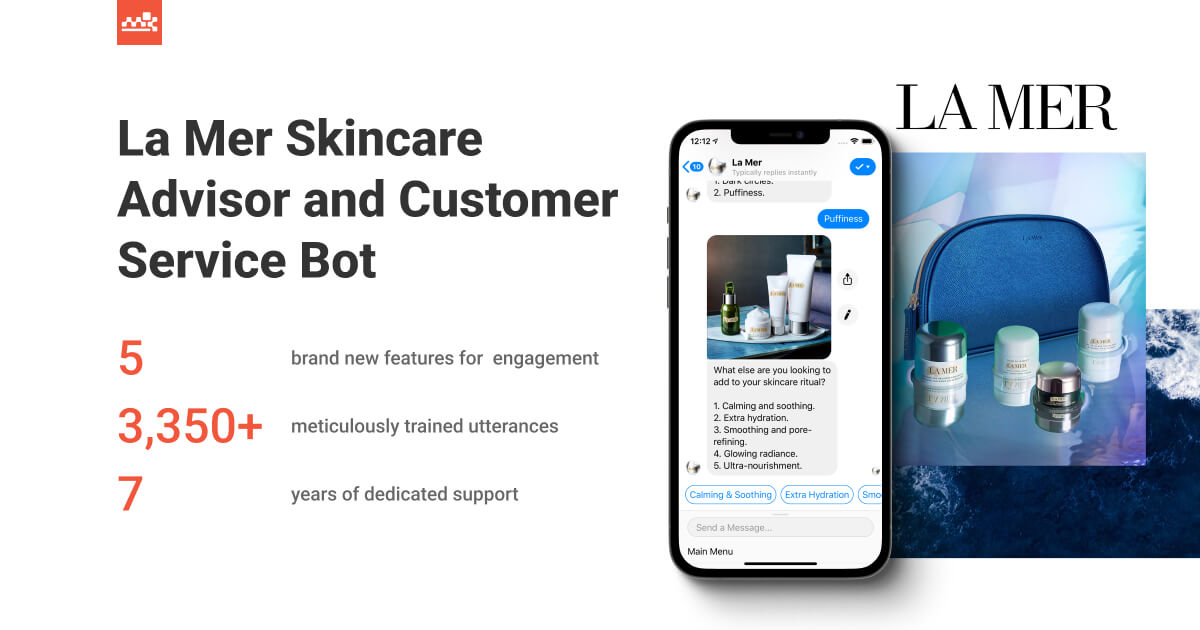
- Burberry Chatbot: Personalized Luxury Engagement. We developed a storytelling-driven eCommerce tool on Facebook Messenger to redefine Burberry’s digital shopping. It allowed customers to explore behind-the-scenes content, watch live runway streams, and receive product recommendations tailored to clients’ style. By blending commerce with narrative, Burberry deepened emotional connections, expanded its reach, and boosted loyalty. The solution enhanced online sales, streamlined client service, and delivered valuable data insights, strengthening the brand’s position as a leader in luxury fashion innovation.

- BloomsyBox Chatbot: Generative AI for Personalization. In partnership with Infobip, we built a personalized eCommerce bot for BloomsyBox, designed to engage users through daily interactive campaigns. Shoppers answered five questions, with the first 150 winners receiving free bouquets – a strategy that boosted engagement and excitement. Using our LOFT framework, we integrated Generative AI to create unique, customizable greeting cards with messages ranging from fun to heartfelt.

Sales & Conversions
- OneClickUpsell: AI-Driven Revenue Growth for Shopify. Master of Code Global created OneClickUpsell (OCU), the first post-purchase one-click upsell app on Shopify, designed to boost revenue without disrupting checkout flow. Over 8 years, OCU evolved into a multifunctional upselling and cross-selling solution with Generative AI at its core. Features include dynamic recommendations, split testing, automated product descriptions, and guidance for new merchants. Trusted by 11K+ stores, OCU has generated $700M+ in upsell revenue, delivering up to 50% higher AOV and a 16% conversion rate.
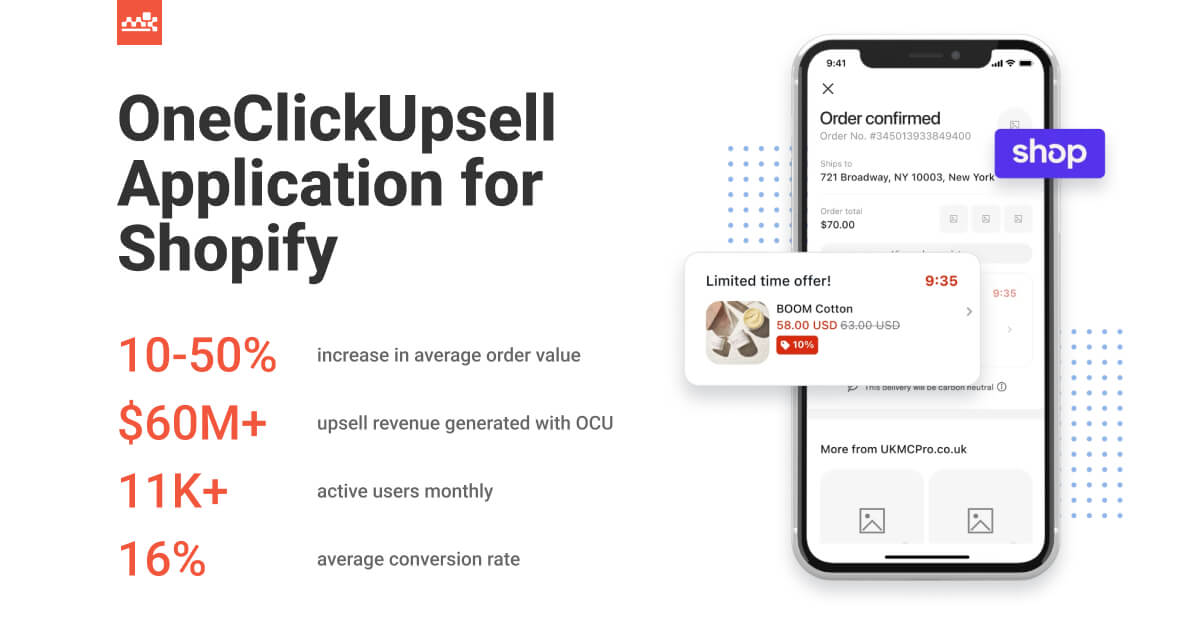
- Zipify Pages: AI-Optimized Landing Pages for Shopify. We partnered with Ezra Firestone to develop Zipify Pages, a powerful page builder that helps Shopify merchants design high-converting landing pages without coding. Featuring 100+ proven templates, responsive design, A/B testing, and in-depth analytics, the tool empowers 15,000+ brands to optimize performance. With Generative AI integration, merchants can instantly generate sales-focused copy, replacing months of manual work. Today, Zipify Pages hosts 100K+ active published pages, driving over 13.5M monthly views and continuous revenue growth.
- Shop JedAI: AI Shopping Assistant for SMB Retailers. Shop JedAI is an advanced solution tailored for small and medium-sized Shopify merchants. Combining a virtual shopping assistant with an AI-powered ad creation tool, it simplifies daily operations while boosting sales. Customers can ask about deliveries, promotions, or products and complete purchases directly in chat, creating a seamless buying journey. Built with OpenAI and vector database technology, Shop JedAI delivers 86% accurate responses, drives engagement, and empowers merchants to launch high-performing campaigns with ease.
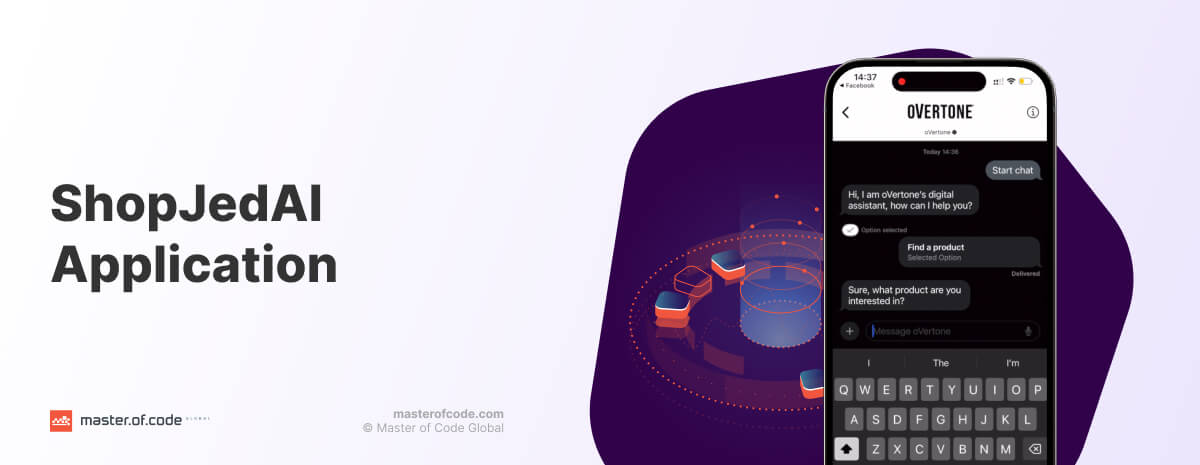
Security & Process Optimization
- AI Chatbot Security Audit: Safeguarding eCommerce Conversations. We partnered with a leading online homeware marketplace to improve the security and performance of its LLM-powered chatbot. Through a three-phase audit covering design, development, and deployment, we mitigated vulnerabilities, optimized conversation flows, and strengthened resilience against misuse. The results were tangible: 10% rise in AOV, $80K saved in breach costs, and a 20% boost in user trust. The audit not only secured sensitive data but also improved satisfaction and operational efficiency.
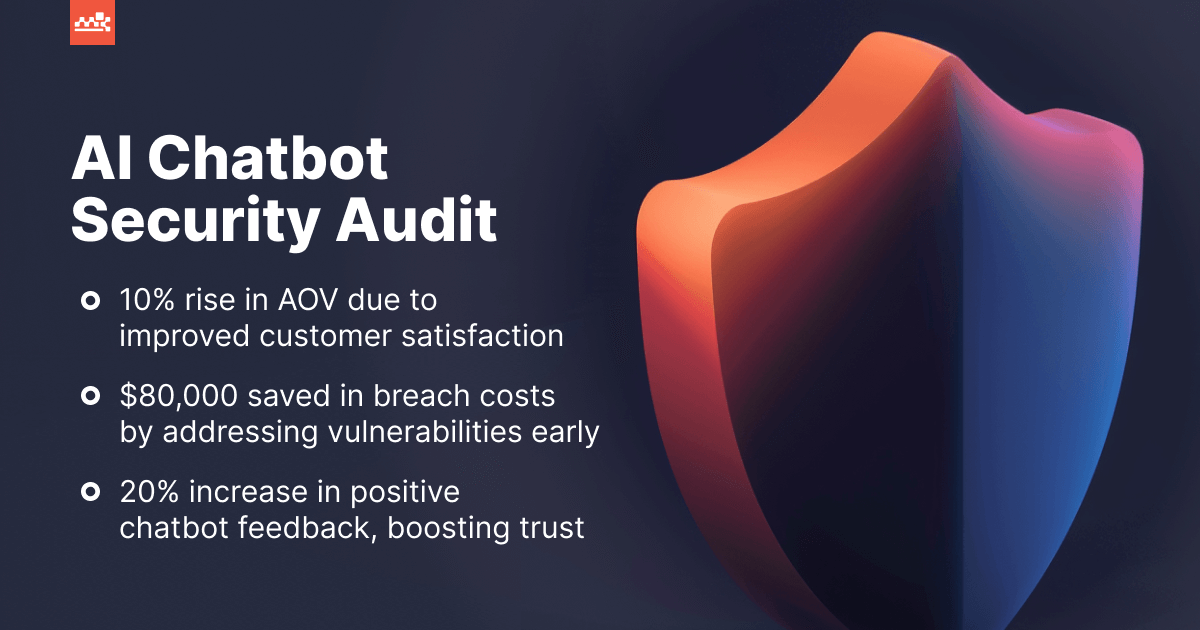
- Tom Ford Beauty: Holiday Gifting Concierge. Our company collaborated with Tom Ford Beauty to cut through holiday marketing noise with an AI-powered Facebook Messenger chatbot. Designed as a personalized gifting concierge, it guided users through tailored product recommendations, enriched with galleries and videos for an engaging experience. The bot seamlessly connected discovery to purchase, driving 8,000+ engagements and over 2,000 product clicks in just one month. This campaign elevated customer engagement, generated quality leads, and strengthened loyalty during the busiest retail season.
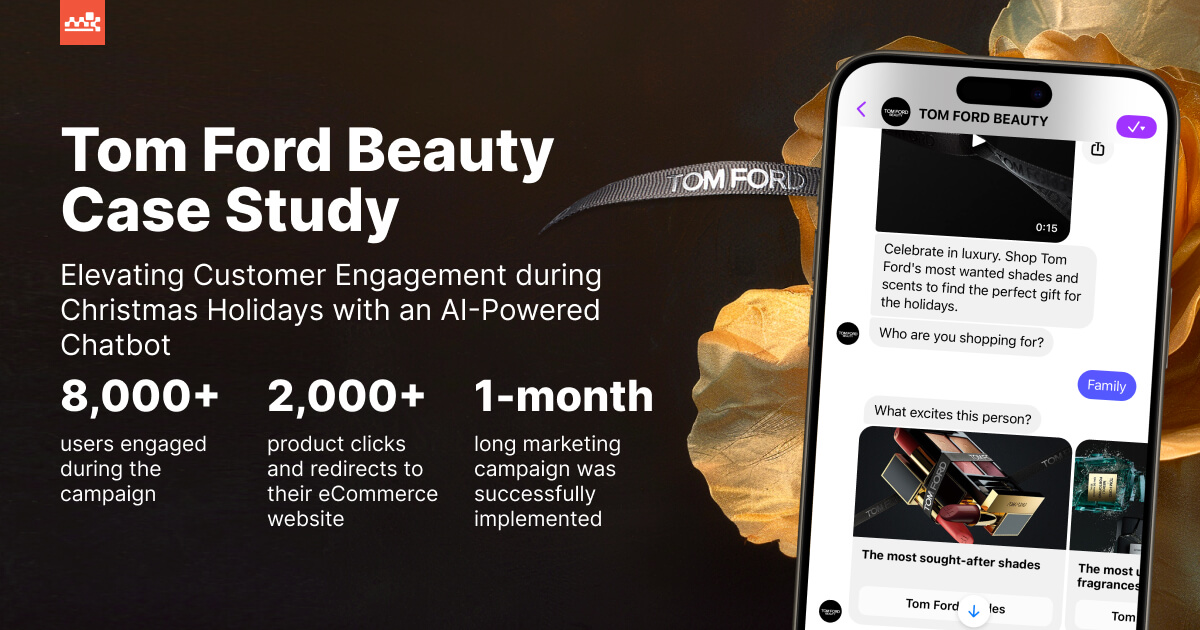
16 Most Powerful AI Use Cases in eCommerce
Artificial intelligence isn’t a vague promise – it’s a set of tools you can plug directly into your store to boost AOV, conversion rates, and efficiency. Below are the AI use cases in eCommerce that deliver measurable impact – from conversational commerce to fraud detection.
Personalization & Recommendations
AI analyzes browsing behavior, purchase history, and even time of day to deliver unique experiences. Instead of blasting the same email to every shopper, AI personalization in eCommerce makes sure each customer sees the products they’re most likely to buy, raising engagement and revenue.
Algorithmic product recommendations don’t guess – they calculate. By analyzing what similar shoppers bought, current cart contents, and trending items, the system surfaces add-ons that customers actually want. That means a $70 shoe purchase turns into a $90 order with care products, automatically increasing AOV.
Search & Discovery
Generic search engines often frustrate shoppers with irrelevant results. eCommerce search AI understands context and intent, delivering accurate matches even when queries are vague or misspelled. The payoff: customers find products faster and are less likely to bounce.
Shoppers now expect to snap a photo or ask a question instead of typing. Visual and voice search powered by AI makes this possible, turning images or spoken words into instant results. For retailers, it means removing friction and converting casual browsers into buyers.
Pricing & Revenue Optimization
AI evaluates competitor prices, current demand, and inventory levels in real time. The result is dynamic pricing that maximizes margin when demand is high and clears stock when it drops – all without manual oversight.
Digital upselling in eCommerce goes beyond “people also bought.” It predicts what each shopper is most likely to add, whether that’s a premium version of a product or a perfectly matched accessory. Every suggestion is tailored to lift the order value.
Fraud Detection & Security
Fraudulent purchases and chargebacks drain profit. Fraud detection in retail systems flag anomalies instantly, analyzing thousands of data points like geolocation, device type, and transaction patterns. This reduces false positives while blocking real fraud before it hits your bottom line – a prime example of how AI tools used in eCommerce enhance trust and resilience.
Scalpers and malicious bots can distort inventory, crash sites, and steal revenue. AI systems monitor for unusual activity in real time, automatically blocking suspicious traffic and keeping your store safe for legitimate customers.
Inventory & Operations
Instead of manually tracking stock, AI inventory management monitors real-time sales and supplier data to prevent overstocking and stockouts. It ensures popular products stay available while eliminating excess storage costs.
eCommerce chatbots predict which items will be in demand weeks or months in advance. By analyzing seasonality, market trends, and customer signals, it helps optimize supply chain decisions – reducing waste and making sure products arrive where demand is highest.
Customer Service & Engagement
User service in eCommerce is no longer basic Q&A. Modern shopping assistants guide clients through product selection, handle returns, and answer personalized questions 24/7. The result: faster support, lower costs, and happier shoppers – the core of modern conversational shopping experiences.
Generative AI for cart abandonment tools don’t just send a reminder email – they identify why the customer left and trigger the right incentive, like a time-sensitive discount or alternate product suggestion. That’s revenue recovered from what would otherwise be lost sales.
Analytics & Forecasting
AI analytics in eCommerce transforms raw data into actionable insights. Instead of endless dashboards, it pinpoints the metrics that matter: which campaigns drive AOV, which channels have the best ROI, and where customers are dropping off. When combined with Conversational AI in retail, these insights become even more powerful, helping brands understand intent in real time and optimize every interaction for conversion.
Demand prediction uses past sales, seasonality, and macroeconomic data to anticipate future demand. This is one of the most valuable use cases for Generative AI in eCommerce, helping teams automate trend insights, user segmentation, and sales optimization with precision.
Generative AI for eCommerce retention is redefining how online stores re-engage customers. By generating personalized reminders, offers, and messages, AI transforms missed purchases into new conversions and builds long-term loyalty.
Operational Efficiency
Order updates, tagging products, updating SKUs – repetitive tasks eat time. AI automates them, reducing manual labor and providing consistency across platforms. Teams get back hours every week to focus on strategy and growth.
Artificial intelligence optimizes workflows end to end – from auto-generating product descriptions to streamlining logistics. The outcome: fewer bottlenecks, faster time-to-market, and reduced operational overhead.
The bottom line: These 16 use cases already live in leading eCommerce brands today. The question is whether your business is ready to adopt them strategically and start multiplying your AOV while your competitors are still experimenting.
The Realistic Future of AI
Artificial intelligence in eCommerce is already taking shape in ways that are rewriting how businesses operate. Generative AI in retail is moving beyond blogs and chat prompts. It’s being used to create thousands of unique product descriptions at scale, making sure every item on a retailer’s website has fresh, SEO-friendly, and customer-specific copy. For merchants managing tens of thousands of SKUs, this is a competitive necessity.
We’re also witnessing the rise of AI agents: autonomous systems that don’t just provide recommendations but act on them. Picture an AI that identifies low-performing categories, adjusts product bundles, and launches a targeted campaign – all without waiting for human intervention. These innovations, combined with retail AI consulting expertise, will blur the line between marketing, operations, and sales.
Perhaps the most disruptive trend is hyper-personalization. The idea of a static webpage showing the same layout and products to every visitor will soon feel archaic. Each shopper will see a dynamically generated storefront tailored to their preferences, history, and context. Your homepage won’t be a homepage – it will be their homepage.
But innovation comes with responsibility. Trust and ethics will define which retailers win long-term. Customers expect customization, but not at the expense of privacy. Transparent data practices, explainable AI, and consent-driven personalization will be the difference between building loyalty and driving people away.
The choice for AI eCommerce businesses is clear: adapt now or become a case study in how competitors captured your market. AI isn’t waiting, and neither are your clients.
Let’s Sum Up
AI in eCommerce isn’t just about testing the latest tool or chasing hype. It’s about solving the exact challenges standing between you and growth. Off-the-shelf platforms can provide a useful start, but they’re built for the average retailer, not for your business. And “average” rarely leads to real competitive advantage.
The real results come from custom AI solutions for eCommerce businesses designed around your unique bottlenecks – the places where revenue leaks, operations stall, or customer experiences fall short. Whether it’s multiplying AOV with smarter recommendations, cutting fraud losses, or giving your team hours back through automation, the companies that win are those that apply AI with focus.
So the question becomes simple: What’s your biggest bottleneck?
That’s where we start. In a strategic scoping call, our team will help you identify your single highest-impact opportunity – the one that can unlock measurable ROI the fastest. Schedule a session now and discover how your greatest challenge can drive your strongest results.






